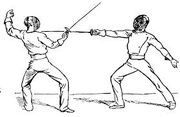
“Touch” by Jessie Fauset
Jessie Fauset was born in Philadelphia in 1884. “She went to public schools in Philadelphia, until she graduated with a scholarship to Cornell University” (Delbanco and Cheuse pg 941). She was the first woman to graduate as a Phi Beta Kappa. She was also the first black woman to be accepted to that prominent academic organization nationally. Later in life she went back to school in Pennsylvania working where she earned her master’s. By 1918 she had begun working as writer for the magazine “Crisis” under W.E.B. Du Bois. In the poem Touche, written in 1927, Fauset gives an example of two lovers who both seem to reminisce on ex-lovers, but jealousy does not take place during this.
“Dear, when we sit in that high placid room, Loving and doving as all lovers do” (Fauset 1-2). This is the opening to the poem touche.”Laughing and leaning so close in the gloom” (Fauset 3). At this point the two lovers are engaged in each other’s company. It appears as if this is a genuine love that is not yet tainted. Then we notice a shift in the two lovers. The female lover questions the male lover, “what is the change that creeps sharp over you?” “Just as you raise your fine hand to my hair bringing that glance of mixed wonder and rue” (Fauset 4-6). The woman has picked up on her lover’s odd behavior and wants an explanation for it. Even though she already has an assumption on his behavior.
“Black hair, “you murmur, “so lustrous and rare, Beautiful too, likes a raven’s smooth wing; Surely no gold locks were ever more fair” (Fauset 7-9). The male lover compares his current lover to his ex-lover. He seems to reminisce for a second. It appears as if the male lover is trying to insinuate that his new lover is much more appealing than his ex; but if you look deeper into it he seems to be reassuring himself of something. Maybe because truly inside he misses the blonde lover of the past and is convincing himself that his new lover is indeed a better one.
The female lover begins to question the actions of her current lover. “Why do you say every night that same thing? Turning your mind to some old constant theme, Half meditating and half murmuring?” (Fauset 10-12). The woman has picked up on her lover’s odd behavior and demands answers for it. Surely something internal is going on with the male lover, but the woman does not appear to be jealous nor angry. She only longs for reasoning behind the male’s peculiar behavior.
“Tell me, that girl of your young manhood's dream, Her you loved first in that dim long ago-- Had she blue eyes? Did her hair goldly gleam?” (Fauset 13-15). The woman seems to definitely be picking up on clues at this point. She has came to the conclusion that her lover dwells on a past lover with blonde hair and blue eyes. A white woman perhaps. Since this poem was written during the times of segregation that tells us that the love affair that had taken place between the man and woman with the gold hair must have been ambiguous and disguised. It must have been a rare type of love that was intense and intriguing. It evidently took a toll on the male lover only leaving him with memories.
Lines 16-18 open up with this” Does she come back to you softly and slow, Stepping wraith-wise from the depths of the past? Quickened and fired by the warmth of our glow?” (Fauset 16-18). Once more the woman questions her lover. At this point the woman seems to be answering her own questions. She realizes exactly what her lover is thinking, and what may be causing his thoughts. She seems to recognize his behavior pattern more and more as if she too has experienced the same thing. Her reaction to her lover’s behavior does not come off as envious but rather corresponding.
Fauset finishes the poem revealing a few secrets. “There I've divined it! My wit holds you fast. Nay, no excuses; 'tis little I care. I knew a lad in my own girlhood's past,--Blue eyes he had and such waving gold hair! “(Fauset 19-22). First Fauset reveals that the new lovers are African American or black. Reasoning behind this is because the female lover comes clean about a blue eyed blonde haired lover in her past as well, which another secret is revealed. Also, the woman informs her lover that an explanation is not needed because she is not unreasonable but more understanding of the circumstance.
The two lovers did not let their thoughts about their ex-lovers affect their relationship. Neither of them became jealous of their ex-lovers. Touche` means, I’ve got you (Wikapedia). At the end of the day they both had a mutual understanding of each other’s past relationships. This was not a situation that caused jealousy or demented behavior. Instead this was something that the two lovers had common ground upon. Something they could both relate to and even share with one another. Instead of this situation pulling the lovers apart it very well could help them grow together. Both had similar traumatic experiences during this time period which were rare and forbidden. The events that had taken place changed their lives forever and both lovers will have memories and a story to tell about the events that had taken place in their lives with ex- lovers.
Section heading[]
Write the first section of your page here.
Section heading[]
Write the second section of your page here.